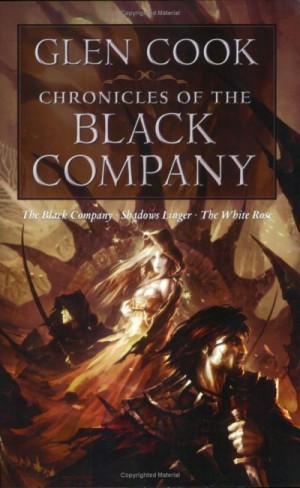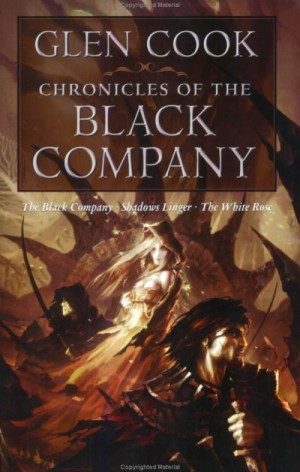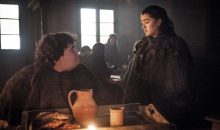Review: The Black Company (Books of the North)

Not pictured: heroism.
As regular readers of this site might have guessed, I’m kind of an aficionado of fantasy best described, not without a shrug and eye-roll, as “gritty.” I like reading about people develop infections and get betrayed. Heroes kick puppies, villains kiss babies. Everything is covered with a faint layer of mud. The Dark Lord may be horrifying, but he takes second place to dental care. And so on. Normally I tend to think of this as a fairly modern thing – Grandpa Tolkien’s patina of myth has tended to shine down through the ages – but there are quite a few fantasy novels of previous generations that hunk down in the muck perfectly well.
And there’s probably no better example than the Chronicles of the Black Company. Back in 1984, when the first book (there were eventually ten) was published, popular fantasy was spearheaded by Eddings, Brooks and Feist. Stephen Donaldson did a few interesting things, but you were mostly getting into the literary equivalent of 80s fantasy films. And then there was Glen Cook, a former Navy serviceman who drew on those experiences to answer a question that must’ve been burning at his mind: what is life like for the Dark Lord’s minions?
Not great, was the answer. The titular Black Company is a mercenary group four hundred years old, forced by circumstance and opportunity to take up service as the go-to regiment of The Lady, a sorceress whose puissance is best explained by the fact that she is just referred to as “The Lady” and everyone in her half of the world knows what that means. Well-paid in the service of evil, and soothing themselves with the very true explanation that the plucky rebellion is just as much a bunch of bastards, the Black Company signs on for a war and gets a good deal more.
The Books of the North, the focus of this review, is a trilogy narrated primarily by the company physician and historian Croaker; when other characters get a POV, it’s implied to be Croaker doing his duty as Annalist to try and reconstruct events. Cook-as-Croaker writes in an exceptionally stark and minimalist style, light on the description and affecting the tone of a middle-aged soldier who really has just about seen it all. It takes some getting used to, but Croaker’s world-weariness and patent sarcasm build a fine rhythm and keep the narrative grounded.
That sort of delivery, blunt sanity in the midst of colorful madness, is sort of a running theme of the books. Characters, particularly among the Company, are referred to by simple nicknames (Silent, Tom-Tom, the Captain, etc*.) or to-the-point titles like The Limper and Soulcatcher. The latter two are high among The Ten Who Were Taken, a quirky pack of sorcerers bound to the Lady and serving as her most dreaded minions; the juxtaposition of these ancient, powerful beings and their dealings with a bunch of low-rent sellswords is a main selling point of the book.
(*One member of the company is named Raven, and presents as a Mysterious Badass With A Past. Perhaps you don’t think you should take a mystery man named Raven seriously. Glen Cook was aware of your opinion even back in the benighted Eighties, and he will address that issue in a fashion that is one of the best payoffs of the series.)
As the story progresses, the stakes rise, and so does the fantastical nature of the world; by the third book, The White Rose, talking menhirs, flying whales, and an immortal, sentient tree all figure prominently. Here Croaker’s dry delivery, and Cook’s attention to detail in keeping all the elements of his setting balanced and believable, really pay off. Some of the climactic scenes do feel lacking, where a more verbose author might be able to give them some punch, but it’s in keeping with how the books work. Croaker’s just writing down what happened for the new recruits; if you want a damn opera, go somewhere else.
One of the most remarkable things about the trilogy might be the middle book, Shadows Linger. It’s…it’s really good. It’s the second book of a trilogy, and it’s really good! It might be the best one! The primary plot mixes in touches of film noir and gothic horror (there is literally an ominous castle in the woods), and the secondary plot features a spectacular anti-hero; not the “90s comic book” sort, but the “Willy Loman” sort. And it even manages to address the meta-plot of the trilogy in a cool way without railroading. Maybe I’m making too big a deal out of it, but I’ve read a lot of middle-trilogy snoozers so I was pretty thrilled about Shadows Linger.
Anyway, the undeniable fact of Company is that Glen Cook writes like a man who’s got somewhere to be, and you might not be able to get past that. I hope you can, because there is a muddy, vicious, occasionally hilarious adventure to be found in those pages. It is worth noting that Myth: the Fallen Lords (probably my favorite PC game of all time, and the subject of an upcoming review) drew a great deal of influence from these books, so if you liked one, you will surely like the other. And if you’ve never tried either, try both!
There’s an omnibus edition of Chronicles of the Black Company pretty easily available these days, and I imagine you can find it used; it’s just the Books of the North, but those are absolutely a self-contained trilogy so you’re not getting into a 10-book slog. Welcome to the Company. The food is crap and the pay is unpredictable, but you didn’t want to die a farmer, did you?






